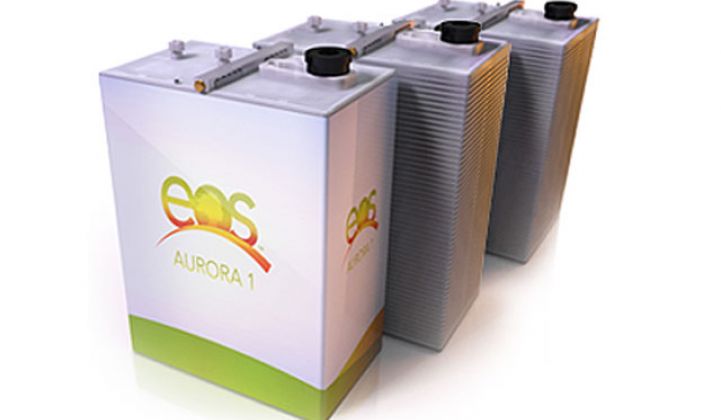Eos Energy Storage closed a $23 million equity financing round C to scale up manufacturing of its Aurora batteries.
The zinc cathode, water-based electrolyte battery technology from Eos hopes to deliver grid-scale energy storage at a new price point, about $160 per kilowatt-hour, far cheaper than current lithium-ion systems.
Eos has reported that there are preorders totaling more than 3,000 megawatt-hours for its Aurora battery, a 1-megawatt, 4-megawatt-hour system. Deliveries are expected in early 2016.
“A successful round C investment signals growing comfort in the investor community, although most are still strategic investors, in non-lithium-ion-based technologies,” said Ravi Manghani, senior energy storage analyst with GTM Research. “A common thread in recent funding announcements is the focus on inexpensive, long-duration technologies.”
Other companies are also targeting lower price points for grid-scale energy storage, including Aquion Energy with its sodium-ion batteries and various flow batteries from startups such as Imergy, UniEnergy and ViZn Energy.
The Eos technology is currently being tested with hometown utility Consolidated Edison, which is using a $250,000 state grant to deploy the battery on the New York City grid. Eos is also testing the Aurora system with GDF Suez and will soon be piloting with Pacific Gas & Electric.
Eos is also collaborating with Enel, National Grid, NRG and Public Service Company of New Mexico through its Genesis program to evaluate and develop its technology to meet utilities’ needs.
“Demand is being driven by utilities and developers in key international markets spanning six continents,” Michael Oster, CEO of Eos, said in a statement.
Eos’ latest financing will be used to scale up pilot manufacturing and continue commercialization efforts for the Aurora battery system to “megawatt-per-month production capability” over the course of the year, Philippe Bouchard, business development manager at Eos, told Greentech Media's Jeff St. John in January.
But the ultimate goal is not to become the manufacturer of this technology, Bouchard added. Eos already has its Aegis program to work with major systems integrators for a turnkey solution, including Toshiba, Gamesa Electric, Ideal Power and other global players. Eos hopes to partner with a large manufacturer to replicate its production lines to deliver 100 megawatts of annual capacity starting next year.
The round was led by AltEnergy and included OCI and nearly all prior investors, including NRG Energy and Fisher Brothers. The round C brings the company’s total funding from investors to about $50 million.
“We have evaluated the entire energy storage landscape and view Eos as the clear leader in cost, safety, and performance,” AltEnergy founder and managing director Russell Stidolph said in a statement. “As investors, we appreciate the company’s emphasis on capital efficiency and believe that Eos is on track to deliver a game-changing product in 2016.”



